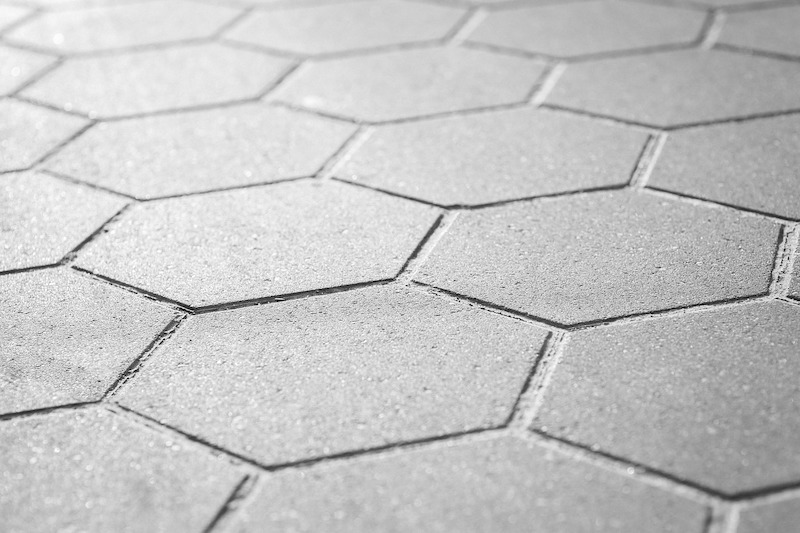Cool pavements—reflective coatings or additives applied to concrete and asphalt—could have an unfortunate byproduct.
New research conducted in Los Angeles’ San Fernando Valley examined the impact of pavements that had been mixed with a reflective additive. The finding: reflected energy from sunlight can make people walking on the pavement significantly hotter.
According to a researcher’s sensors, on a hot, dry day, a pedestrian could feel more than 7 degrees warmer on a “cool pavement,” compared to how he or she would feel on a standard blacktop. The standard dark pavement stores some of the energy and converts it into heat, while the cool pavement reflects more energy.
Studies support the notion that reflective surfaces can reduce the heat island effect by a few degrees in urban areas, but at least in the brightest times of the day, they can make people walking on them feel hotter. Since 2015, Los Angeles has covered about 50 city blocks in reflective coatings and seals, and plans to continue with this initiative.
Related Stories
MFPRO+ News | May 20, 2024
Florida condo market roiled by structural safety standards law
A Florida law enacted after the Surfside condo tower collapse is causing turmoil in the condominium market. The law, which requires buildings to meet certain structural safety standards, is forcing condo associations to assess hefty fees to make repairs on older properties. In some cases, the cost per unit runs into six figures.
Codes and Standards | May 10, 2024
California law that ended single-family zoning is struck down by court
A law ending single-family-home-only zoning in California was ruled unconstitutional by a Los Angeles County Superior Court judge. The decision could lead to the law being invalidated in the state’s largest cities.
Sustainability | May 10, 2024
Perkins&Will’s first ESG report discloses operational performance data across key metrics
Perkins&Will recently released its first ESG report that discloses the firm’s operational performance data across key metrics and assesses its strengths and opportunities.
Codes and Standards | May 10, 2024
Guide on electrifying space heating for large commercial buildings with boilers released
The U.S. Department of Energy has released a guide on electrifying space heating for large commercial buildings with boilers. The guide summarizes key considerations for people seeking to retrofit existing large commercial and multifamily buildings, particularly those that currently heat spaces using fossil fuel-fired boilers.
MFPRO+ News | May 10, 2024
HUD strengthens flood protection rules for new and rebuilt residential buildings
The U.S. Department of Housing and Urban Development (HUD) issued more stringent flood protection requirements for new and rebuilt homes that are developed with, or financed with, federal funds. The rule strengthens standards by increasing elevations and flood-proofing requirements of new properties in areas at risk of flooding.
Government Buildings | May 10, 2024
New federal buildings must be all-electric by 2030
A new Biden Administration rule bans the use of fossil fuels in new federal buildings beginning in 2030. The announcement came despite longstanding opposition to the rule by the natural gas industry.
Codes and Standards | May 10, 2024
Specification for field testing newly installed storefronts, curtain walls, sloped glazing systems updated
The Fenestration and Glazing Industry Alliance (FGIA) updated a specification establishing requirements for field testing newly installed storefronts, curtain walls, and sloped glazing systems.
Codes and Standards | May 3, 2024
New York City considering bill to prevent building collapses
The New York City Council is considering a proposed law with the goal of preventing building collapses. The Billingsley Structural Integrity Act is a response to the collapse of 1915 Billingsley Terrace in the Bronx last December.
AEC Tech | Apr 30, 2024
Lack of organizational readiness is biggest hurdle to artificial intelligence adoption
Managers of companies in the industrial sector, including construction, have bought the hype of artificial intelligence (AI) as a transformative technology, but their organizations are not ready to realize its promise, according to research from IFS, a global cloud enterprise software company. An IFS survey of 1,700 senior decision-makers found that 84% of executives anticipate massive organizational benefits from AI.
Codes and Standards | Apr 30, 2024
Updated document details methods of testing fenestration for exterior walls
The Fenestration and Glazing Industry Alliance (FGIA) updated a document serving a recommended practice for determining test methodology for laboratory and field testing of exterior wall systems. The document pertains to products covered by an AAMA standard such as curtain walls, storefronts, window walls, and sloped glazing. AAMA 501-24, Methods of Test for Exterior Walls was last updated in 2015.

















